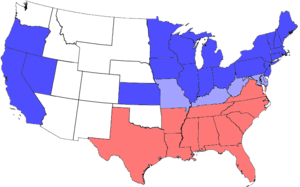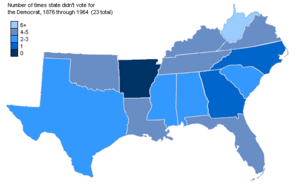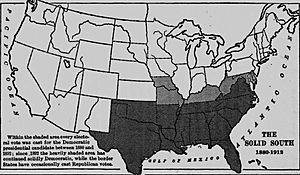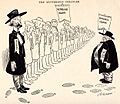Solid South facts for kids
The Solid South or Southern bloc was a group of states in the Southern United States that mostly voted for the Democratic Party. This happened because these states shared similar interests, especially after the American Civil War.
This "Southern bloc" was strongest from the end of Reconstruction in 1877 until the Civil Rights Act of 1964 was passed in 1964. During this time, the Democratic Party controlled most state governments in the South. Many local, state, and federal politicians from these states were Democrats.
In the late 1800s and early 1900s, Southern Democrats made laws that stopped many black people from voting. Some non-Southern states did this too. This created a system where only one party, the Democrats, had real power. If a candidate won the Democratic primary election, they were almost guaranteed to win the actual election. Democrats also used "white primaries" to stop black people from voting in primary elections.
The term "Solid South" refers to the states that were part of this voting group. The U.S. Census defines the Southern region as sixteen states and Washington, D.C. These include Delaware, Florida, Georgia, Maryland, North Carolina, South Carolina, Virginia, Washington, D.C., West Virginia, Alabama, Kentucky, Mississippi, Tennessee, Arkansas, Louisiana, Oklahoma, and Texas. Over time, the idea of the Solid South changed. Not all these states were always "solid" Democratic. For example, Maryland, Delaware, Missouri, and West Virginia became less reliably Democratic over time.
Contents
History of the Solid South
How the South Became Solidly Democratic

At the start of the American Civil War, 15 of the 34 U.S. states allowed slavery. Slavery was also legal in District of Columbia. Eleven of these states left the United States to form the Confederacy. These states were South Carolina, Mississippi, Florida, Alabama, Georgia, Louisiana, Texas, Virginia, Arkansas, Tennessee, and North Carolina.
Four slave states stayed with the Union: Maryland, Missouri, Delaware, and Kentucky. These were called the border states. In 1861, West Virginia was formed from part of Virginia and joined the Union in 1863.
After the Civil War, the U.S. government, led by the Republican Party, ended slavery and gave black people the right to vote. In some Southern states, black voters were a majority or close to it. Republicans, supported by black voters, controlled state governments in these states.
The Democratic Party in the South became the voice for white Southerners who wanted to bring back white supremacy and stop black people from voting. Groups like the Ku Klux Klan and other violent groups worked to stop Republicans and scare black voters.
Democratic Control and Voter Restrictions
By 1876, Democrats had taken control of all state governments in the South. From then until the 1960s, Democrats almost completely controlled Southern state and local governments. They elected nearly all U.S. Representatives and Senators from the South. Democratic presidential candidates usually won easily in the region.
Democrats kept white voters loyal by reminding them of the South's suffering during the war. They blamed "Yankee invaders" (Republicans) and praised the "Lost Cause" of their white ancestors. This message worked well in most of the South. However, it didn't work in areas that had supported the Union, like eastern Tennessee. These areas continued to vote Republican.
Even after white Democrats regained power, some black politicians were elected to local and state offices. Black U.S. Representatives were elected from the South until the 1890s, usually from areas with many black residents. Also in the 1890s, the Populists gained support among poor white people who disliked the Democratic Party leaders. Populists sometimes teamed up with Republicans (including black Republicans) and challenged the Democrats.
To stop these alliances and reduce election violence, Southern Democrats passed new laws between 1890 and 1910. These laws made it harder for both black people and poor white people to vote. They included:
- Poll taxes: Voters had to pay a fee to vote.
- Longer residency rules: Voters had to live in an area for a longer time.
- Literacy tests: Voters had to pass difficult reading and writing tests.
- Grandfather clauses: These allowed people to vote if their grandfather had voted before the Civil War. This mostly helped white voters, as black people could not vote before the war.
These rules effectively stopped most black citizens and many poor white citizens from voting. This ensured that the Democratic Party would control the South for most of the 20th century.
Southern Democrats also opposed Republican economic policies, like high tariffs and the gold standard. They felt these policies helped Northern businesses more than Southern farms. But their main goal was to keep all political power. The national Democratic Party did not support civil rights for black people from 1876 to 1944. Southern Democrats in Congress blocked any civil rights efforts by Republicans.
White Democrats also passed "Jim Crow" laws. These laws enforced racial segregation, meaning black and white people were kept separate in public places. The Fourteenth Amendment said that states that stopped people from voting would lose representation in Congress. However, this rule was never used against Southern states. For decades, no black candidate was elected to office in the South. Black people were also kept off juries and out of other parts of public life.
Cracks in the Solid South
Democratic candidates won by large margins in the South in almost every presidential election from 1876 to 1948. The only exception was 1928, when the Democratic candidate was Al Smith, a Catholic from New York. Even then, the South gave Smith most of his electoral votes.
In the Deep South (South Carolina, Georgia, Florida, Alabama, Mississippi, Louisiana, and Texas), Democratic control was very strong. They often won 80%–90% of the vote. Only a few Republican state or local officials existed. Mississippi and South Carolina were the most extreme examples.
By the 1920s, memories of the Civil War began to fade, and the Solid South started to show small cracks. For example, a Republican was elected to the U.S. House from Texas in 1920. In the 1920 elections, Tennessee elected a Republican governor and several Republican U.S. House members. It was the first former Confederate state to vote for a Republican president since Reconstruction. However, with the Democratic victory in 1932, the South became solidly Democratic again.
In the 1930s, black voters outside the South largely switched to the Democratic Party. Other groups interested in civil rights, like Jewish people, Catholics, and intellectuals, also gained influence in the party. This led the national Democrats to support civil rights in their platform in 1948.
Some Southern Democrats, called "Dixiecrats," left the party in 1948. They ran their own presidential candidate, Strom Thurmond, who won four states: South Carolina, Alabama, Mississippi, and Louisiana. Even before this, some conservative Southern Democrats were unhappy with the national party's support for labor unions during Franklin D. Roosevelt's presidency. They started voting for different parties in different elections.
The population of the South also began to change. From 1910 to 1970, about 6.5 million black Southerners moved to cities in other parts of the country in the Great Migration. Florida also grew rapidly as retirees and others moved there. Many of these new residents were Republicans, which weakened the South's traditional dislike for Republicans. The Republican Party began to gain support in the South.
By the mid-1960s, changes were clear. Former Dixiecrat Senator Strom Thurmond of South Carolina switched to the Republican Party in 1964. Texas elected a Republican Senator in 1961. Florida and Arkansas elected Republican governors in 1966. In the Upper South, where Republicans had always had some presence, they gained more seats in Congress.
Throughout the 1970s and 1980s, the South was still mostly Democratic at the state level. But this slowly changed. Older Democratic politicians retired or passed away, and older voters who were strongly Democratic also died. More people moved to the South, especially in Florida, Texas, Virginia, Maryland, and North Carolina.
In the 1994 elections, Republicans won a majority of the House seats in the South for the first time. As of 2021, Republicans hold most House seats in every Southern state except Virginia, Maryland, and Delaware.
After the 2016 elections, Republicans controlled every state legislative chamber in the South for the first time ever. This changed when Democrats won back both houses of the Virginia Legislature in 2019.
Today, the South is largely a Republican stronghold at both the state and national levels.
West Virginia's Unique Path
West Virginia had a different experience. Unlike other border states, West Virginia did not send most of its soldiers to the Union during the Civil War. After the war, the state government passed laws that limited the rights of former Confederate soldiers. These laws stopped them from voting, practicing law, or teaching.
When these limits were lifted in 1871, a Democrat, John J. Jacob, was elected governor. A new state constitution was written by former Confederates. By 1876, all eight state Democratic candidates were elected, and seven were Confederate veterans. For a generation, West Virginia was part of the Solid South.
However, Republicans returned to power in West Virginia in 1896. They controlled the governorship for eight of the next nine terms and elected many U.S. Representatives. In 1932, as the nation shifted to Democrats, West Virginia became strongly Democratic. It was one of the most reliably Democratic states from 1932 to 1996.
Since 2000, West Virginia voters have shifted towards the Republican Party. This is partly because the Democratic Party became more associated with environmental policies that affect the state's coal industry. West Virginia is now considered a solidly Republican state.
Presidential Voting in the South
The 1896 election was the first time the Solid South showed a crack. The Republican candidate won Kentucky and West Virginia.
In the 1904 election, Missouri voted for Republican Theodore Roosevelt.
By the 1916 election, most black people and poor white people in the South could no longer vote. This helped Democrat Woodrow Wilson win all electoral votes across the South (except Delaware and West Virginia).
The 1920 election was about President Wilson's idea for a League of Nations. Many in the South wanted to stay out of international affairs, which helped Republican Warren G. Harding. He won Tennessee, Missouri, Oklahoma, and Maryland.
In 1928, Herbert Hoover, a Republican, won many Southern states. This was partly because his Democratic opponent, Al Smith, was Catholic and against Prohibition. Hoover won Florida, North Carolina, Texas, and Virginia, which had not voted Republican since Reconstruction. He also came very close to winning Alabama.
The South appeared "solid" again during Franklin D. Roosevelt's time as president. His programs helped the South, especially during the Dust Bowl.
When Democratic President Harry S. Truman supported the civil rights movement in 1948, many Southerners left the Democratic Party. They formed the Dixiecrat Party. Their candidate, Strom Thurmond, won Alabama, Louisiana, Mississippi, and South Carolina in the 1948 election.
In the 1952 and 1956 elections, the popular Republican Dwight D. Eisenhower won several Southern states. He did especially well in new suburban areas. In 1956, Eisenhower became the first Republican to win Louisiana since 1876.
In the 1960 election, Democratic candidate John F. Kennedy chose Lyndon B. Johnson of Texas as his running mate. Both supported civil rights. When Martin Luther King Jr. was arrested in Atlanta, Kennedy called King's wife, and his brother Robert F. Kennedy helped get King released. This made many white voters in the South turn away from the Democrats.
The 1960 election was the first time a Republican presidential candidate won electoral votes from the former Confederacy while losing the national election. Richard Nixon won Virginia, Tennessee, and Florida. Alabama and Mississippi gave their electoral votes to Harry F. Byrd, a segregationist Democrat, instead of Kennedy.
The parties' stances on civil rights continued to change before the 1964 election. Democratic candidate Johnson worked hard to pass the strong Civil Rights Act of 1964. After signing it, Johnson famously said, "I think we just delivered the South to the Republican Party for a long time to come." In contrast, Republican candidate Barry Goldwater voted against the Civil Rights Act. He believed it gave too much power to the federal government.
In November 1964, Johnson won a huge victory nationally. But Goldwater, besides his home state of Arizona, won the Deep South: Alabama, Georgia, Mississippi, and South Carolina. These states had voted Republican for the first time since Reconstruction.
The "Southern Strategy" and the End of the Solid South
The "Southern strategy" was a plan by Republicans to attract white voters in the South. In the 1968 election, Richard Nixon saw the changing South as a chance for the Republican Party. With help from Senator Strom Thurmond, Nixon campaigned on "states' rights" and "law and order." These phrases were understood by many black leaders to support the existing discrimination in Southern states.
The independent candidate George Wallace, a former Democratic governor of Alabama, also ran. He openly attacked integration and black civil rights. Wallace won most of the Deep South states. Nixon won Virginia, Tennessee, North Carolina, South Carolina, Florida, Oklahoma, Kentucky, Missouri, and Delaware. The Democrat, Hubert Humphrey, won Texas, West Virginia, and Maryland.
The 1968 election was the first time both the Upper South and Deep South voted against the Democratic Party at the same time. By 1972, Nixon won every Southern state, marking the first time a Republican did so.
In the 1976 election, Jimmy Carter, a Southern governor, brought a brief Democratic comeback in the South. He won every state in the old Confederacy except Virginia. However, in his 1980 re-election bid, he only won his home state of Georgia, West Virginia, and Maryland. 1976 was the last year a Democratic presidential candidate won most of the South's electoral votes.
Republicans won all of the South's electoral votes in the 1984 election and every state except West Virginia in 1988.
In the 1992 and 1996 elections, when the Democratic ticket included two Southerners (Bill Clinton and Al Gore), the Democrats and Republicans split the region. Clinton won Arkansas, Louisiana, Kentucky, Tennessee, West Virginia, Missouri, Maryland, and Delaware. Republicans won Texas, Mississippi, Alabama, North Carolina, South Carolina, Virginia, and Oklahoma.
In 2000, Al Gore received no electoral votes from the South, except from Maryland and Delaware. This trend continued in 2004. However, in 2008, Barack Obama won Virginia and North Carolina, and Florida. Obama won Virginia and Florida again in 2012. In 2016, Hillary Clinton won only Virginia. In 2020, Joe Biden won Virginia and Georgia.
While the South was shifting from Democrats to Republicans, the Northeastern United States went the other way. From 1992 to 2012, all nine Northeastern states voted Democratic, except for New Hampshire in 2000.
The "Southern Strategy" Today
Republicans gradually gained strength in presidential elections in the South starting in 1952. But they didn't fully take over Southern politics at the state and local levels until the 2010 elections. Today, Republicans control most political offices in the South.
After the 2014 elections, there were no white Democratic members of Congress from the states that voted for George Wallace in 1968, until Doug Jones was elected Senator from Alabama in 2017. Before November 2010, Democrats had majorities in several Southern state legislatures and U.S. House delegations.
However, in the 2010 midterm elections, Republicans swept the South. They won many Senate and House seats. They also took control of both houses of the Alabama and North Carolina State Legislatures for the first time since Reconstruction. Mississippi and Louisiana followed a year later. In 2012, Republicans gained control of the Arkansas State Legislature and the North Carolina Governorship. In 2014, both houses of the West Virginia legislature also went to the GOP.
Many experts believe the "Southern Strategy" used by Republicans since the 1960s is now mostly complete. Republicans have strong control over political offices in the South. However, there are still some exceptions, like the governorship of Louisiana, won by John Bel Edwards in 2015 and 2019.
The state of Virginia is a big exception to this trend. It started shifting to the Republican Party earlier than the rest of the South. However, due to large population growth in Northern Virginia and people moving from the Democratic Northeast, the Democratic party has won almost every major statewide election in Virginia since 2005.
Images for kids
-
Missouri goes for Republican Theodore Roosevelt in the 1904 election. (Cartoon by John T. McCutcheon.)
 | John T. Biggers |
 | Thomas Blackshear |
 | Mark Bradford |
 | Beverly Buchanan |




